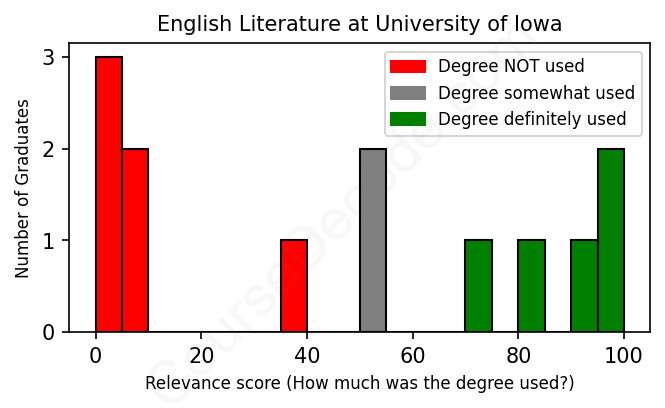
First, some facts. Of the English Literature graduates from University of Iowa we've analyzed , here's how many have used (or NOT used) their degree in their career:

These are estimates based on AI analysis of 13 LinkedIn profiles (see below).
The verdict? Bad. Overall, with an average relevance score of 45%, English Literature graduates from University of Iowa have a substantially lower likelihood (-22%) of finding work in this field compared to the average graduate across all fields:
And for comparison, here's the chart for all profiles we've looked at across all degrees.
Also, after graduating, only 23% of these graduates have pursued further education other than another Bachelor's degree (such as a Masters degree or other), compared to the average across all profiles of 35%. This suggests a Bachelors degree is enough for most English Literature graduates, and it's normal to look for work straight after graduation.
See the details:
|
Relevance score: 100% We think this person has gone into a career highly relevant to their degree. We think this person has gone into a career highly relevant to their degree.
DEGREE INFOGraduated in 2022 from University of Iowa with a Bachelor's degree in English Literature. No other secondary education since. JOB HISTORY SINCE GRADUATIONCustomer Service Representative The Book Marq Jul 2022 - Present ABOUTI have quite a few years of experience with working and interacting with the public in various ways. I also enjoy creating written content to share with people, and enjoy discussing how I can use said content to reach a wider audience and share what I'm passionate about with others! |
The top 10 most common jobs done by the graduates we've analyzed (ranked most common to least) are:
Looking at the job history of people with an English Literature degree from the University of Iowa, it seems that many graduates have ended up in professions that don’t really relate to their studies. A considerable number of them found positions in customer service, claims processing, and various roles in the retail and food industries. These jobs, like being a Customer Service Representative or even a Sandwich Maker, don’t leverage the analytical or writing skills one might expect to develop through an English Literature program. Instead, they focus more on interpersonal skills and basic operational tasks that are pretty far removed from reading or analyzing texts.
On the flip side, there are some graduates who have landed roles that are directly aligned with their degree, like being a Copy Editor, Proofreader, or even an English Tutor. These positions definitely make the most of the writing, editing, and critical thinking skills gained during their studies. However, it’s clear that such roles are the exception rather than the norm. Overall, while some grads do find relevant jobs in editing or teaching, a significant portion has taken paths that seem to drift away from English Literature, making the real-world application of their degree a bit of a mixed bag.
Here is a visual representation of the most common words in job titles for English Literature graduates (this is across all English Literature graduates we've analyzed, not just those who went to University of Iowa):

Looking at the career trajectories of graduates from the University of Iowa with a degree in English Literature, there seems to be a mixed bag of outcomes. Right out of college, many of these graduates take on entry-level positions that aren't necessarily aligned with their degree. For example, roles like Customer Service Representative and various positions in retail or claims processing seem to be common first jobs. These positions often provide some valuable experience in communication and problem-solving, even if they aren't directly related to literature or writing.
As time goes on, though, there are some who find their way into more relevant careers. A few individuals have gone into editing, proofreading, or writing roles, which are closely linked to their studies in English Literature. Other graduates pivot into education or academic administration. However, it’s also clear that many take on jobs in customer service and management that might not utilize their literature skills directly. Five to ten years after graduation, we see a mixture of people moving into roles that either capitalize on their degrees or diverge significantly from it. While some graduates find fulfilling paths related to literature, it’s undeniable that many end up in positions that, though stable, aren’t what you might envision for an English major. So, while there's definitely potential for a rewarding career directly connected to English Literature, it’s equally likely that many will need to adapt their skills to a broader job market.
Getting a Bachelor’s degree in English Literature at the University of Iowa can be a mix of hard and enjoyable, like most English programs. It’s not necessarily super easy, since you’ll be diving into a lot of reading, analyzing texts, and writing essays that require you to think critically and creatively. You’ll explore a wide range of literature, from classics to contemporary works, which can be super rewarding but also demanding at times. If you don’t mind putting in the effort to engage deeply with the material and express your thoughts clearly, you might find it manageable and even fun. Overall, it’s a bit tougher than some majors, but the challenge can be worth it if you love reading and discussing great literature!
Most commonly, in the LinkedIn profiles we've looked at, it takes people 4 years to finish a Bachelor degree in English Literature.
So, looking at these grad profiles from the University of Iowa, it seems like they’re kind of mixed when it comes to money. Some have worked their way into decent-paying roles, especially those in claims and healthcare, which often pay pretty well as you gain experience. For example, the Senior Claims Specialist and the Healthcare Professional positions likely come with a better paycheck. On the flip side, some alumni are still stuck in entry-level or part-time gigs, like sandwich-making or basic customer service roles, which probably aren’t bringing in a ton. Overall, it looks like while some have found financial stability and potentially good salaries, others might still be hustling to make ends meet. So, really, it varies a lot based on the path they took after college.
Here is a visual representation of the most common words seen in the "about" section of LinkedIn profiles who have a Bachelor degree in English Literature (this is across all English Literature graduates we've analyzed, not just those who went to University of Iowa). This may or may not be useful:

Here are all colleges offering a Bachelor degree in English Literature (ordered by the average relevance score of their English Literature graduates, best to worst) where we have analyzed at least 10 of their graduates: